Nutrition plan

4+ months
Each baby is different, so the right time for transition to solid foods can vary, but you certainly should not rush. Between the 4th and 6th month of age, your baby is ready for eating its first solid foods, as its gastrointestinal system is ready at that time. Besides that, it is advised to introduce solid foods by the 6th month of age, as thus your baby can take certain nutrients necessary for proper growth and an adequate caloric compensation. By introducing solid foods in this period, future problems with feeding and rejection of solid foods are avoided. There are various signs that your baby is ready for solid foods.
When the baby is ready for introduction of solid food, it is able to hold its head up fully stable by itself, it does not have a food spitting reflex anymore, it begins to show interest in what it eats, it even leans forward or reaches for the food from the plate. You will realize that milk does not give a sufficient feeling of fullness. If the baby still cries after being breastfed, it can also be a sign. Thus it will ask for more milk or more frequent meals. Waking up at night can also be a sign that the baby is not quite full after the last meal before going to bed. However, if these signs appear before the 4th month of age, it is too early to introduce solid foods. Remember that no baby is the same and each baby has an individual rhythm of progress, so you shouldn’t worry if your baby does not show these signs and is still not ready for solid foods. It is best to consult the doctor for all additional questions.
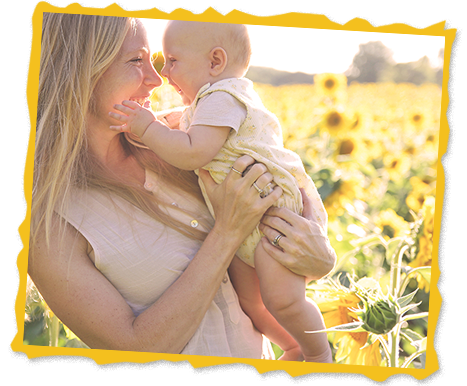
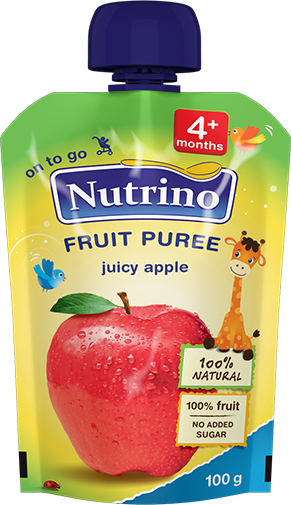
FRUIT PUREE JUICY APPLE
100% natural
100% fruit
No added sugar
Practical on to go
6+ months
Your baby has become a real curious explorer with a desire for discovering a world around it. It can sit, chew, hold the bottle by itself and shows ever more interest in food. In this period, the baby is ready for more solid foods, introduction of new foodstuffs and expanding the menu.
Meal Pattern
In this period, it is also important to establish regular meals and good habits, in order for the baby to eat healthily. Almost all the babies demand food, at some point. They learn to distinguish what they like and dislike, and accept some food better than, or reject some other and eat less. .
Be patient. If the baby does not like certain food, offer once again a small quantity of that food in some other meal. Sometimes it is necessary to try with the acceptance of the new food even up to 15 times. If your baby does not want to eat food, do not force it, but do not offer alternative food at that moment, in order not to teach it that there are always ’’better“ options.
The important nutrients that should be taken in this period are proteins, iron, vitamins and fibres. Meat is a very important source of some nutrients and an important part of the child’s diet around the 6th month of age. For easier swallowing, meat should always be given together with vegetables. After the baby’s six months of age, you can offer it combined cereals as well - containing wheat, oats, and rye, with the addition of fruit

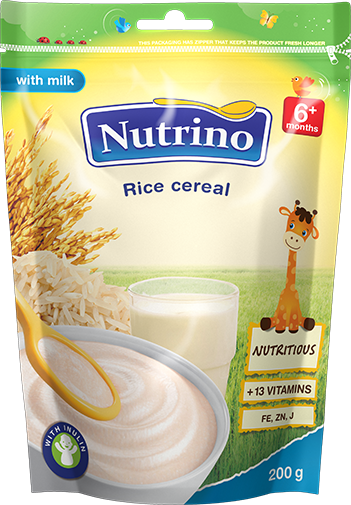
RICE CEREAL
+13 vitamns
Iron, zinc, iodine
With inulin
100% delicious
Rich in fibers
Gives a sense of satiety
8+ months
When the child turns eight months of age, solid foods begin to dominate over breastfeeding or child formula in its diet. It is the time when a slow transition is made from mashed food to regular family diet.
This transition is very important as based on it you will be know whether your baby has developed an appetite for solid foods. The child needs food rich in nutrients for its emotional, nutritional and physical development. There is still a series of foods not tasted by your baby and allergy reactions are still possible. You have, probably, already increased the amount of solid foods taken by the baby, because the older it gets, the more it is used to solid foods. At 8 months of age, the child begins to understand that it can use the index finger and the thumb in order to take pieces of food. It likes to eat by itself. This is an ideal time for offering it a food from your hand and including it in the feeding process.

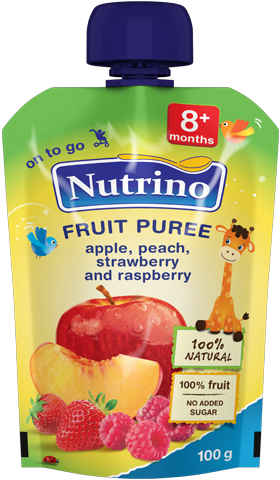
FRUIT PUREE – APPLE, PEACH, STRAWBERRY AND RASPBERRY
100% natural
100% fruit
No added sugar
Practical on to go
12+ months
By introducing ever more complementary foodstuffs, once the child turns one it achieves a significant tolerance to food and there are not so many prohibitions as in the child age. It is, however, important to pay attention to establishing a proper relation with food, and in order to achieve it, you should abide by some rules of meal distribution and of behaviour during the meal. Here are several such rules:
A meal time should certainly be respected. Avoid at any cost offering food to the child immediately before or after the main meal, as thus you risk that the child has smaller appetite at the time of the main meal and eats a little, or that it becomes very hungry and eats too much.
The child should eat the lunch or dinner sitting at the table (or in its special feeding chair while still little), and watching TV and play during the meal can be allowed only on some special occasions..
The child should be encouraged to taste the dishes it does not like as well, by serving them in an attractive manner or preparing them in some new way (puree, half-veggie burgers, with sauce, etc.).

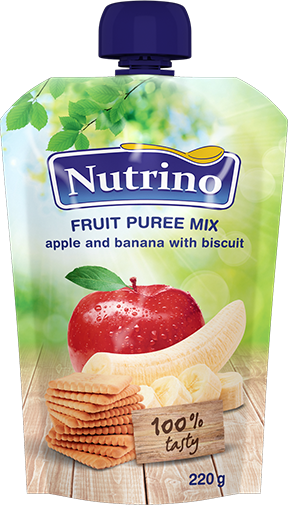
FRUIT PUREE MIX – APPLE AND BANANA WITH BISCUIT
100% natural
Fruit snack
Many fruits, many benefits
Practical on to go